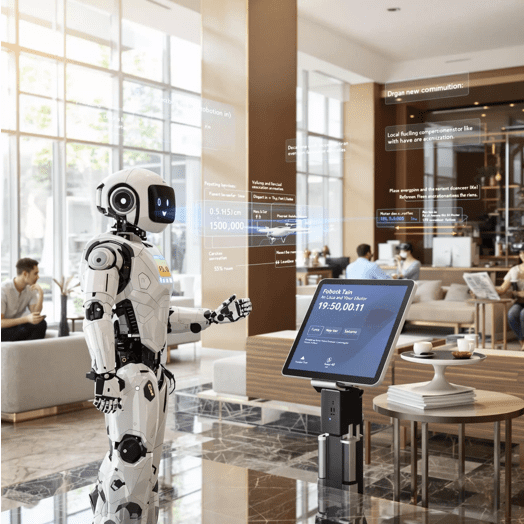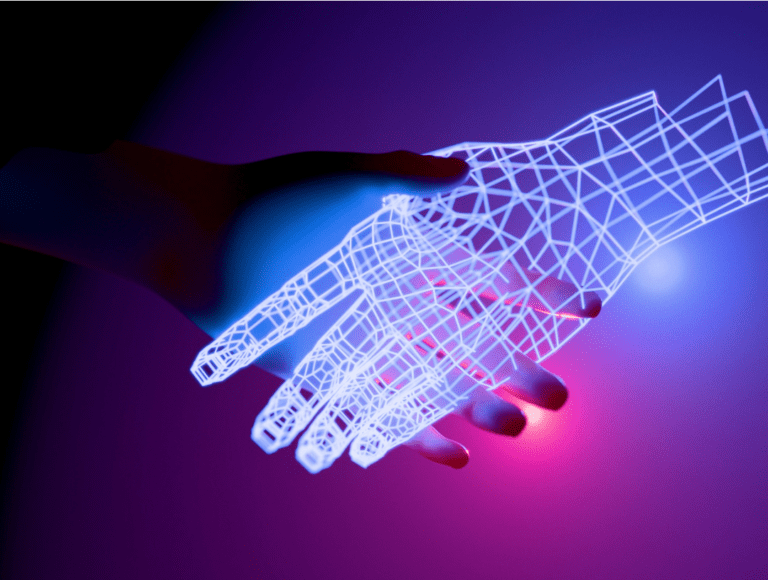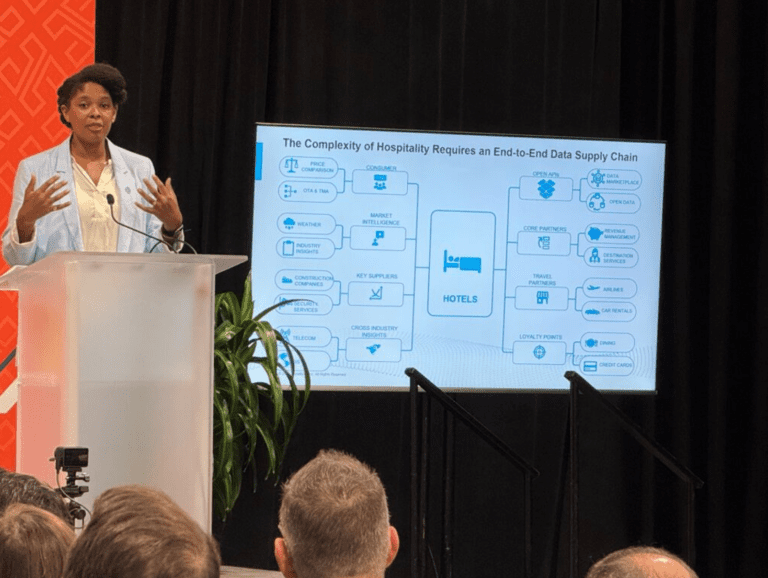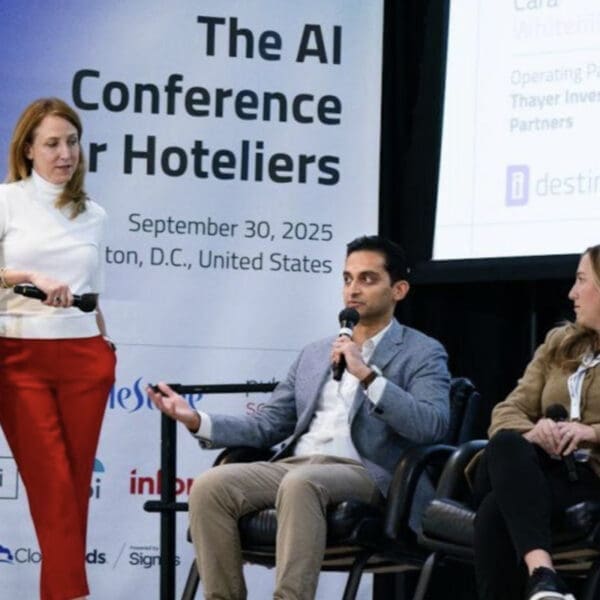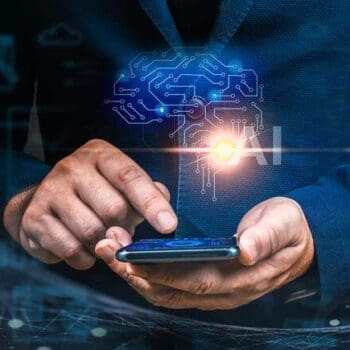 The AI transformation in the hotel industry represents a significant shift towards more efficient, personalized, and guest-centric services. Integrating AI should not only focus on deploying new technologies but also on enhancing the skills of the hotel staff.
The AI transformation in the hotel industry represents a significant shift towards more efficient, personalized, and guest-centric services. Integrating AI should not only focus on deploying new technologies but also on enhancing the skills of the hotel staff.
Upskilling employees non-intrusively involves blending traditional hospitality values with modern technological advancements, ensuring that people and technology work in harmony.
The importance of skills and upskilling for hotel employees in the context of AI integration cannot be overstated. As AI technologies become increasingly embedded in hotel operations, from guest services to back-end management, employees must be equipped with the necessary skills to interact with these systems effectively.
Upskilling ensures that staff members are proficient in utilizing AI tools and understand how to leverage these technologies to enhance guest experiences, improve operational efficiency, and make informed decisions. By prioritizing continuous learning and development, hotels can foster a workforce that is adaptable, tech-savvy, and capable of working alongside AI in harmony, ultimately leading to a more innovative, responsive, and competitive hospitality environment.
Here are some creative and innovative steps for training hotel employees in the age of AI:
1. AI-assisted onboarding and training modules
Develop interactive onboarding programs using AI to simulate real-life scenarios that employees might face. For instance, create a virtual environment where front desk staff can practice handling different guest requests, complaints, or check-in processes. These AI-driven simulations can adapt to the learning pace of each employee, providing personalized feedback and guidance.
2. Gamified learning experiences
Incorporate gamification into learning modules to make the training process more engaging and enjoyable. Use AI to create dynamic game scenarios that evolve based on the employee’s learning progress. For example, housekeeping staff could participate in a game where they have to manage room cleaning and maintenance tasks within a certain time, with AI generating different levels of complexity and unexpected situations.
3. Augmented Reality (AR) for skill enhancement
Utilize AR for practical training sessions where employees can wear AR glasses to see real-time information or instructions while performing a task. For example, maintenance staff can see step-by-step repair instructions overlaying the actual machinery they are fixing, helping them learn and complete tasks more efficiently.
4. AI-powered language learning tools
For hotels with an international clientele, it’s crucial that staff can communicate in multiple languages. Provide access to AI-powered language learning apps that personalize the learning content based on the user’s proficiency level and job requirements, such as learning hospitality-related vocabulary and phrases.
5. Feedback and performance analysis
Use AI systems to analyze employee performance data and provide constructive feedback. AI can identify patterns and suggest areas for improvement, making the feedback process more objective and comprehensive. For instance, AI could analyze the tone and speed of a front desk employee’s speech and offer tips to improve their communication skills.
6. Mentorship and peer learning platforms
Create an AI-driven platform where employees can connect with mentors or peers based on specific learning goals or challenges. The platform can suggest matches based on skills, experience, and learning preferences, facilitating a collaborative learning environment.
7. Real-time assistance and support
Implement AI-powered virtual assistants that employees can access anytime for immediate help or information. Whether it’s a question about hotel policies, a guest’s preferences, or how to operate a new piece of technology, the AI assistant can provide instant support, enhancing the employee’s ability to perform their duties effectively.
Examples of AI enhancing day-to-day operations:
- AI Chatbots for Guest Services: Employees can learn from AI chatbots by observing how they handle common guest inquiries, freeing staff to focus on more complex and personalized guest interactions.
- Predictive Analytics for Personalized Guest Experiences: AI can analyze guest data to predict preferences and behaviors, helping staff anticipate and meet guest needs more effectively, thus enhancing the guest experience.
- Smart Energy Management: AI can optimize energy consumption in hotel operations, and staff can learn to use these systems to maintain comfort while reducing costs and environmental impact.
Conclusion: revolutionizing learning and innovation through AI
AI has the potential to revolutionize the way hotel employees learn, making the process more effective and faster, which in turn fosters a culture of innovation and openness to transformation. AI-driven learning platforms can tailor educational content to the individual needs and learning styles of each employee, ensuring that the material is both engaging and effective.
For instance, AI can analyze an employee’s performance and learning progress in real time, adjusting the difficulty level of training modules or suggesting personalized learning paths. This adaptive learning approach not only accelerates the learning process by focusing on areas that need improvement but also keeps employees engaged and motivated by presenting challenges that are just right for their skill level.
Moreover, AI can unlock creative and innovative potential within hotel employees by exposing them to a wide range of scenarios and problem-solving exercises that they might not encounter in their day-to-day operations. Through simulations, virtual reality, and gamified learning experiences, employees can experiment with different strategies, learn from their mistakes in a risk-free environment, and gain insights into best practices and innovative solutions.
This experiential learning, powered by AI, encourages employees to think outside the box, be more adaptable to change, and develop a proactive approach to guest service and hotel management. As a result, the workforce becomes more equipped and enthusiastic about embracing AI-driven transformations, leading to a more innovative, efficient, and guest-focused hotel operation.



